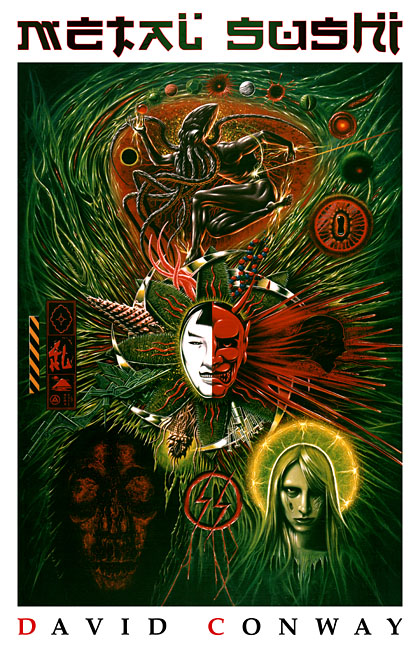 Starry Wisdom had a story called “Black Static”, by David Conway. It wasn’t the best story in the collection, but it was the defining story – the one that kind of spoke for the others. Then I read Starry Wisdom‘s sequel and “Manta Red” went one better – it was the defining story of the volume and the best one.
Starry Wisdom had a story called “Black Static”, by David Conway. It wasn’t the best story in the collection, but it was the defining story – the one that kind of spoke for the others. Then I read Starry Wisdom‘s sequel and “Manta Red” went one better – it was the defining story of the volume and the best one.
Metal Sushi contains both these tales, and four others. Conway’s work could be described as the bang-from-behind bastard children of surrealist literature and those ultra violent 90s anime where the human body is a bag containing about twenty gallons of pressurized blood. He throws a lot at you – lots of themes, lots of ideas, and lots of dense, adjective-stuffed prose.
The first story is “Eloise”, which is like an Oscar Wilde or Edgar Allan Poe story performed in modern dress – very dark and romantic. “Black Static” is more chaotic and challenging, and extracting meaning from it feels more like deciphering tea-leaves than the normal reading of a story. “Manta Red” (the greatest story in this volume, too) is the interstice between the two.
This collection gathers all of Conway’s strengths as a writer, but it gathers all of his weaknesses, too. Metal Sushi suffers from “too much”, particularly “too much writing.” Certain parts sound like the kind of thing they make fun of in the Bulwer-Lytton contest. “His failing metabolism slid further along the steep, declining gradients of encroaching mortality”…he grew old, in other words.
But it also suffers from “not enough.” Despite the purple prose, Metal Sushi feels cold, with not enough energy or passion. It lays out thousands of ideas, but often to little effect. At times it reads like an author writing sentences around interesting words he found in a thesaurus (“A numinous parallax whose focal apex is rooted deep in the reptilian matrix of avatistic consciousness”) – and Michael Gira and James Havoc play that game much better.
But to be honest, I knew what I was getting into. “Black Static” and “Manta Red” were very memorable, but then one has to ask what they were memorable for. David Conway’s writing is a fragmentation bomb of words, blasting you with sensations and ideas, but at the same time blasting other ideas ineffectively away from you. It’s not focused. This is the kind of book that tries to do everything at once, and cram Lovecraft and Akira and Burroughs and Blade Runner into one book. Does it work? Not always. In fact, not even often.
At first, I thought the title was nonsense. Now I see that I was wrong – this book is exactly like metal sushi. Different. Not much nutritional value. Likely to give you tetanus. But eating (or reading) it will be an experience you’ll remember for a while, and I think that was the author’s main intention.
No Comments »
Comments are moderated and may take up to 24 hours to appear.
No comments yet.
